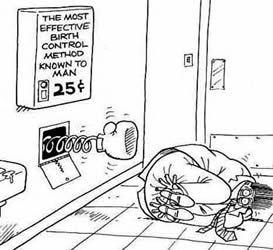|
By Audrey Lee'16 and ScM'17 Both men and women are responsible for pregnancy. After all, it takes two to tango. Then, why is it that the responsibility of contraception often falls on women? The answer to this question is founded in the lack of successful male contraceptive tools currently available. For years, researchers have tried to create birth control for men. Such male birth control would need to be target-specific, reversible, druggable and effective, with minimal side effects. The realistic possibility of a male contraceptive was first introduced by a study orchestrated by the World Health Organization [1]. In the study, a series of shots that contained two hormones, progestogen and testosterone, were administered to male participants every eight weeks. The effects of the hormone shots were positive, significantly reducing sperm count to levels consistent with male infertility obstacles. However, the study was shut down due to negative side effects, such as acne and mood swings [2].
Following the clinical trial setback for male contraception and the associated public backlash, researchers returned to the drawing board. While the majority of the public has turned their attention away from male contraception, many researchers have continued to chip away at the biological iceberg that is male birth control. While no birth control is perfect, male contraception has been particularly difficult to address. One major difference between male and female birth control methods stems from a biological numbers game. Women produce one egg each month, while men are constantly producing millions of sperm. It is much easier to take advantage of a single, reoccurring biological event, such as the female menstrual cycle, which can be reliably predicted [3]. Digging into the molecular mechanisms that control sperm production and motility reveal that there is still hope in developing effective methods that inhibit sperm from reaching the egg. Recently, the Journal of Reproductive Biology published a study linking a sperm-specific molecular channel to regulation of sperm motility. This “cation channel of sperm,” or CatSper for short, is able to control the extent to which sperm are able to swim through the female reproductive tract and reach the egg [4]. This molecular channel has only been found in sperm, making it an excellent candidate for male birth control. If researchers can develop a drug that can effectively and specifically inhibit this channel, then sperm will be unable to reach the egg, ultimately preventing pregnancy. Such an inhibitor will likely remove the side effects caused by hormone imbalances seen in the halted clinical trials, since CatSper functions independently of hormones such as testosterone. This recent finding illustrates a molecular basis for sperm motility control, which can be further studied as a potential target for male contraception. The next step for researchers will be to develop a molecule that specifically and effectively prevents CatSper from functioning. The preliminary results of this study outline a promising path for the development of a safe and potent form of male birth control. Works Cited: [1] Scutti S. Male birth control shot found effective, but side effects cut study short [Internet]. CNN. Cable News Network; 2016. Available from: http://www.cnn.com/2016/10/30/health/male-birth-control/ [2] Behre HM, Zitzmann M, Anderson RA, Handelsman DJ, Lestari SW, Mclachlan RI, et al. Efficacy and Safety of an Injectable Combination Hormonal Contraceptive for Men. The Journal of Clinical Endocrinology & Metabolism. 2016Oct27;101(12):4779–88. [3] Staff NPR. Male Birth Control Study Killed After Men Report Side Effects [Internet]. NPR. NPR; 2016. Available from: http://www.npr.org/sections/health-shots/2016/11/03/500549503/male-birth-control-study-killed-after-men-complain-about-side-effects [4] Vicente-Carrillo A, Álvarez-Rodríguez M, Rodríguez-Martínez H. The CatSper channel modulates boar sperm motility during capacitation. Reproductive Biology. 2017Jan8;17(1):69–78.
2 Comments
9/8/2017 11:55:15 am
I am 100% at your back for this road safety forum you are having. It's a great way of instilling to the people the value of safety when on the road and thus, preventing any accidents from happening. In our country, the rate of minor road accidents seems to rise so this forum would be helpful especially if attended by people mainly using the road for transportation.
Reply
2/14/2019 10:04:44 pm
Great Information sharing .. I am very happy to read this article .. thanks for giving us go through info.Fantastic nice. I appreciate this post.
Reply
Leave a Reply. |

